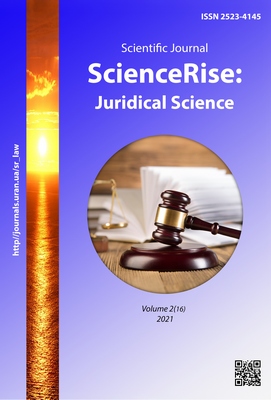Criminal procedural guarantees of the rights of persons in proceedings with mutual legal assistance and in the order of adoption
DOI:
https://doi.org/10.15587/2523-4153.2021.235325Keywords:
international cooperation, international legal assistance, adoption proceedings, procedural guaranteesAbstract
The article is devoted to the issues related to the implementation of criminal procedural guarantees in the provision / receipt of international legal assistance and adoption proceedings. Emphasis is placed on the fact that in the scientific doctrine there is no established definition of criminal procedural guarantees in the provision / receipt of international legal assistance and in the implementation of proceedings by the way of adoption. It is proposed to understand them as a set of legally established methods and means (general and special), which ensure the effective implementation of the tasks of criminal proceedings, as well as prevent violations of procedural rights of persons involved, as well as their fundamental rights, freedoms and legitimate interests. The position of scholars on the separation of the following constituent elements in the system of criminal procedural guarantees is supported: criminal procedural form; general principles of criminal proceedings; procedural status of a person; criminal procedural mechanism for exercising the rights of the subjects of the criminal proceedings related to the provision / receipt of international legal assistance and the transfer of proceedings from the competent authorities of a foreign state. The disclosure of the content of criminal procedural guarantees, which are implemented in the studied procedural forms of international cooperation in criminal proceedings is through the prism of these interconnected and interdependent elements
References
- Pogoretsky, N. A. (2014). The concept of criminal procedural guarantees. Chasopys Natsionalnoho universytetu «Ostrozka akademiia», 2 (10). Available at: http://lj.oa.edu.ua/articles/2014/n2/14pmakph.pdf
- Hroshevyi, Yu. M., Kaplina, O. V. (2010). Kryminalnyi protses. Kharkiv: Pravo, 608.
- Boyko, I. I. (2019). Application of coercive criminal-procedural measures in extradition process. Odessa, 244.
- Vynohradova, O.I. (2000). Mizhnarodne spivrobitnytstvo Ukrainy u haluzi borotby zi zlochynnistiu (kryminalno-protsesualnyi aspekt). Kharkiv, 22.
- Zuiev, V. V. (2017). Kryminalni protsesualni harantii prav osoby pry mizhnarodnomu spivrobitnytstvi pid chas kryminalnoho provadzhennia. Kharkiv: Oberih, 204.
- Zuiev, V. V. (2015). Kryminalni protsesualni harantii prav osoby pry mizhnarodnomu spivrobitnytstvi pid chas kryminalnoho provadzhennia. Kharkiv, 220.
- Malaniuk, A. H. (2004). Provadzhennia u kryminalnykh spravakh, poviazane z mizhnarodnymy vidnosynamy, za zakonodavstvom Ukrainy. Lviv, 237.
- Ovchinskiy, V. S. (2001). Interpol (v voprosakh i otvetakh). Moscow: INFRA-M, 320.
- Pashkovskyi, M. I. (2007). Kontseptsiia mizhnarodnoho spivrobitnytstva z kryminalno-protsesualnykh pytan. Aktualni problemy derzhavy i prava, 27, 13–19.
- Smyrnov, M. I. (2006). Instytut vzaiemnoi pravovoi dopomohy u kryminalnykh spravakh: suchasnyi stan ta perspektyvy rozvytku. Odesa: Feniks, 242.
- Tatarov, O. (2015). Problems of proof in criminal proceedings in adopting of intercept. Visnyk kryminalnoho sudochynstva, 4, 87–95.
- Pro mizhnarodni dohovory Ukrainy (2004). Zakon Ukrainy No. 1906-IV. 29.06.2004. Available at: https://zakon.rada.gov.ua/laws/show/1906-15#Text
- Morozov, S. M., Shkaranuta, L. M. (2000). Slovnyk entsyklopedychnykh sliv. Kyiv: Naukova dumka, 680.
- Alekseev, S. S. (1983). Pravo i perestroyka: voprosy, razdumya, prognozy. Moscow: YUrid. lit. 234.
- Ponomarenko, A. V. (2013). Poniattia «Yurydychni harantii» v trudovomu pravi. Zbirnyk naukovykh prats Kharkivskoho natsionalnoho pedahohichnoho universytetu im. H. Skovorody. «Pravo», 20, 37–41.
- Stakhura, B. I. (2016). The role of public authorities in ensuring human and civil rights in a democratic society: theoretical and legal aspects. Lviv, 180.
- Rabinovych, P. M. (2001). Zdiisnennia prav liudyny: problemy obmezhuvannia (zahalnoteoretychnyi aspekt). Pratsi Lvivskoi laboratorii prav liudyny i hromadianyna. Seriia I. Doslidzhennia i referaty, 3, 13–14.
- Trofymenko, V. M. (2000). Kryminalno-protsesualni harantii osobystosti v stadii sudovoho rozghliadu. Kharkiv, 188.
- Yanovska, O. H. (1998). Pravovi harantii diialnosti advokata-zakhysnyka v kryminalnomu protsesi. Kyiv, 223.
- Khimicheva, G. P. (2002). Ponyatie i naznachenie ugolovnogo proizvodstva (ugolovnogo protsessa). Ugolovniy protsess: obschaya chast. Vol. 10. Moscow, 315.
- Horban, O. M. (2004). Osnovy teorii system ta systemnoho analizu. Zaporizhzhia: HU ZIDMU, 204.
- Witold Litwa v Poland – 26629/95 (2000). Available at: https://hudoc.echr.coe.int/fre#{%22itemid%22:[%22002-6873%22]}
- Nechyporuk i Yonkalo proty Ukrainy (2011). Rishennia u spravi YeSPL Zaiava No. 42310/04. Available at: https://zakon.rada.gov.ua/laws/show/974_683#Text
- Tatarov, O. Yu. (2016). Zatrymannia na grunti pereiniattia. Zakon i biznes. Available at: https://zib.com.ua/ua/print/121014-chi_mozhna_timchasovo_zaareshtuvati_gromadyanina_ukraini_och.html
- Ukhvala Malynovskoho raionnoho sudu m. Odesy (2021). Provadzhennia 1- m/521/19/21. Available at: https://reyestr.court.gov.ua/Review/94917180
- Kryminalnyi protsesualnyi kodeks Ukrainy: naukovo-praktychnyi komentar (2013). Kharkiv: Odissei, 1104.
- Ukhvala Kyivskoho raionnoho sudu m. Odesy (2019). Provadzhennia 1-ks/520/4274/19. Available at: https://reyestr.court.gov.ua/Review/81271639
Downloads
Published
How to Cite
Issue
Section
License
Copyright (c) 2021 Anastasiia Pidgorodynska, Liliia Shirobokova

This work is licensed under a Creative Commons Attribution 4.0 International License.
Our journal abides by the Creative Commons CC BY copyright rights and permissions for open access journals.
Authors, who are published in this journal, agree to the following conditions:
1. The authors reserve the right to authorship of the work and pass the first publication right of this work to the journal under the terms of a Creative Commons CC BY, which allows others to freely distribute the published research with the obligatory reference to the authors of the original work and the first publication of the work in this journal.
2. The authors have the right to conclude separate supplement agreements that relate to non-exclusive work distribution in the form in which it has been published by the journal (for example, to upload the work to the online storage of the journal or publish it as part of a monograph), provided that the reference to the first publication of the work in this journal is included.








